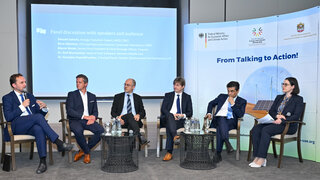Germany and the UAE set the course for the 9th year of their Partnership

Several bilateral events and meetings took place on the sidelines of the IRENA General Assembly under the umbrella of the Emirati-German Energy and Climate Partnership. At the 9th High-Level Steering Group Meeting on 13 January 2025, H.E. Stefan Wenzel, Parliamentary State Secretary at the German Federal Ministry for Economic Affairs and Climate Action (BMWK), and H.E. Sharif Al Olama, Undersecretary at the UAE Ministry of Energy and Infrastructure (MOEI), presented and finalized the Partnership’s 2025 work plan.
The 2025 work plan focuses on key priorities, including hydrogen and Sustainable Aviation Fuel (SAF), climate action, renewable energy system integration and power system flexibility, energy efficiency, and industrial decarbonization. Additionally, the partnership will place a strong emphasis on enhancing private sector and start-up engagement, driving innovation and collaboration in these critical areas. The 9th Emirati-German Energy Day, held in Abu Dhabi on 13 January 2025, centered on enabling flexibility for successful renewable energy integration. H.E. Stefan Wenzel and H.E. Sharif Al Olama, together with UAE and GER officials and business leaders, discussed the necessary conditions to successfully integrate higher shares of renewable energy into the power system. Enhanced flexibility is crucial to fulfilling the COP28 consensus, which calls for tripling global renewable energy capacity and doubling annual energy efficiency improvements by 2030.
H.E. Stefan Wenzel said: "The Emirati-German Energy and Climate Partnership exemplifies the power of collaboration in driving the renewable energy transition while promoting economic growth and energy security. By driving key areas like power system flexibility, energy efficiency, involving start-ups and accelerating cross-border energy cooperation, we are turning ambition into action and advance on our shared COP28 commitments"
The speakers discussed available technologies and tools to enable renewable energy integration. In a keynote, H.E. Ahmed Ali Al-Ebrahim, CEO at GCC Interconnection Authority, highlighted interconnection as a flexibility resource for the power system, while René Matthies, Chief Financial Officer and Executive Director for Corporate Operations at the Emirates Water and Electricity Company (EWEC), shared challenges and solutions for successful renewables integration. Other key inputs included a presentation on digital solutions for renewable energy integration by Helmut von Struve, Chief Executive Officer at Siemens Middle East, an overview and assessment of power system flexibility options by Dr. Georgios Papaefthymiou, Expert at Elia Grid International (EGI), and a presentation on BESS as a key flexibility resource in emerging storage markets by Marek Wolek, Senior Vice President & Chief Strategy Officer at Fluence. The event was moderated by Karin Zangerl from the German Emirati Joint Council for Industry & Commerce (AHK) and Dr. Karoline Steinbacher from Guidehouse.
The Emirati-German Energy and Climate Partnership is an initiative of the German Federal Ministry for Economic Affairs and Climate Action and the UAE Ministry of Energy and Infrastructure, supported by Guidehouse and the German Emirati Joint Council for Industry & Commerce (AHK).